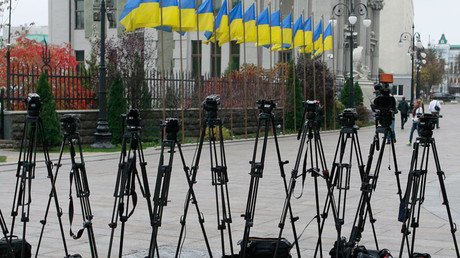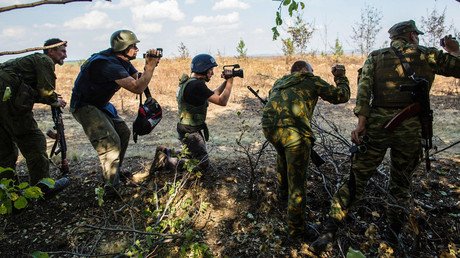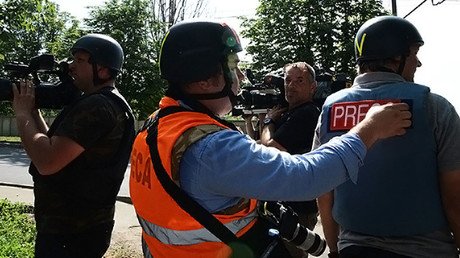EU presses Kiev over fresh leak of journalists’ data by Ukrainian witch-hunt website
European officials have urged Kiev to delete yet another list of foreign journalists “accused” of covering the situation on the ground in eastern Ukraine by a notorious website which claims to be hunting “enemies of the state” and “terrorist collaborators.”
Speaking to Ukraine’s Interior Minister Arsen Avakov, EU envoy to Ukraine Jan Tombinski and Germany’s ambassador Christof Weil put forward a number of demands regarding the controversial Mirotvorets (Peacekeeper) website that has been shut down twice in the past, but made a comeback on Tuesday with the publication of new personal information about almost 300 journalists.
The EU representatives asked Avakov to make sure the documents are removed from public view and that such publications will never appear again, the European Union in Ukraine reported on its Facebook page.
The journalists whose personal information was leaked, ambassadors said, should be provided with the necessary protections, especially, taking into account that some of them have already received threats. Tombinski and Weil also urged law enforcement agencies of Ukraine to conduct a proper investigation into the matter.
The personal information leaked by the Ukrainian site includes the names of 293 journalists, their addresses and telephone numbers with the majority of them from Austria, Germany, Georgia, Brazil and Iraq and working for respectable news outlets such as BBC, Sky News, Al Arabiya, Reuters, AFP, The Daily Telegraph, The Times, the Guardian, Der Spiegel, Deutsche Welle, Newsweek, The Washington Post, Hürriyet and others.
A number of RT correspondents, including Roman Kosarev and Miguel Francis Santiago have also been exposed by the leak.
“Even if the journalists’ personal data is eventually deleted, Mirotvorets has completed one of its goals,” Kosarev commented upon the exposure. “From now on foreign media outlets, already not super objective, will be even more reluctant to send their reporters to Donbass for covering the conflict, and will look up for information in official sources that have a rather creative attitude toward the war in the eastern part of the country.”
“First I was kind of speechless, I thought it was a joke, maybe,” recalls Miguel Santiago. “But then I started thinking: how did we even come to this in the 21st century, where the freedom of press should be respected no matter how ‘unliked’ a news outlet is. Just because I happen to work for an English-speaking international outlet that happens to be Russian-sponsored, and I am a US citizen, I get put on a kill list? By a country that wants to join the European Union? And nothing is done about that, not by a US embassy, not by international human rights groups?”
Outrage as Ukrainian witch-hunt site leaks personal info of ‘terrorist-collaborating journalists’ https://t.co/Lk6Lgdb2aT
— RussianEmbassyCanada (@RussianEmbassyC) May 12, 2016
The previous publications by Mirotvorets have caused an international outcry among the media personalities and triggered an investigation into an alleged violation of privacy and the endangering of journalists’ lives. This however did not stop the website, patronized by a Ukrainian MP and aide to the interior minister Anton Gerashchenko, from going online for the third time with a fresh list of so-called “collaborators and terrorist supporters.”
Human Rights Watch reiterated that the “publication of this kind of list, especially given that it has been endorsed by high-level government officials, jeopardizes the safety and reputation of all journalists – and especially Ukrainian journalists,” the NGO told RT in an emailed statement.
Meanwhile OSCE referred to an earlier statement by Representative on Freedom of the Media Dunja Mijatovic, who on May 11 called the previous publication an “alarming development which could further endanger the safety situation for journalists.”
Mirotvorets claims to be fighting separatism and terrorism and publishes personal data of anyone its contributors consider “enemies of Ukraine.” The website was founded in January 2015 by Georgy Tuka, who now serves as a deputy to the minister responsible for dealing with rebel-held areas and refugees. The website’s partners, besides the high-ranking MPs, include the Security Service of Ukraine and the country’s Interior Ministry.
The project was caught in a scandal in the past after at least two Ukrainian public figures, writer Oles Buzina and former lawmaker Oleg Kalashnikov, were killed days after their home addresses were published by Mirotvorets.















